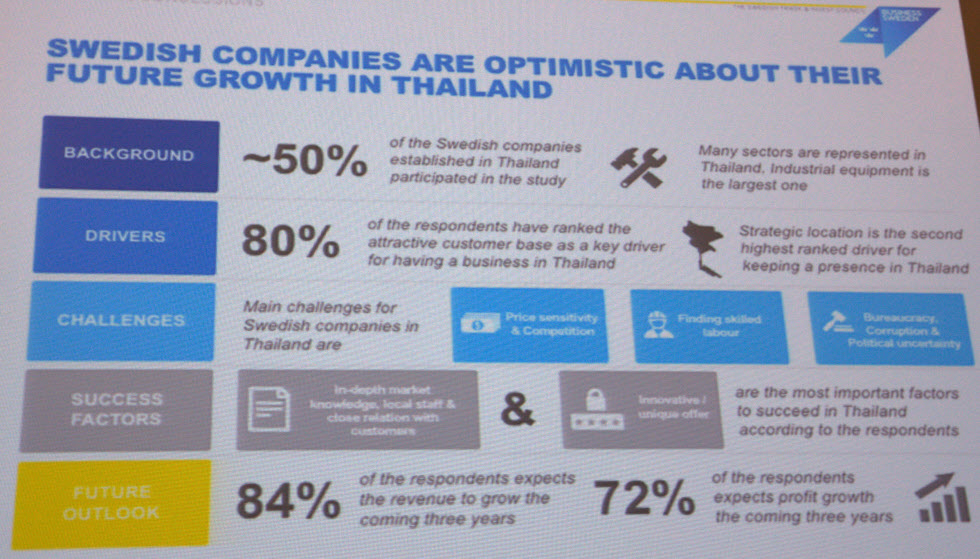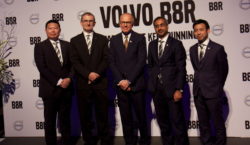In June Business Sweden in Thailand launched the new report ‘Thailand: Business Climate Survey 2018’. Business Sweden, together with the Embassy of Sweden in Thailand and Thai-Swedish Chamber of Commerce, conducted a survey during Feb-Apr 2018 with the purpose to understand how Swedish companies established in Thailand perceive the business climate.
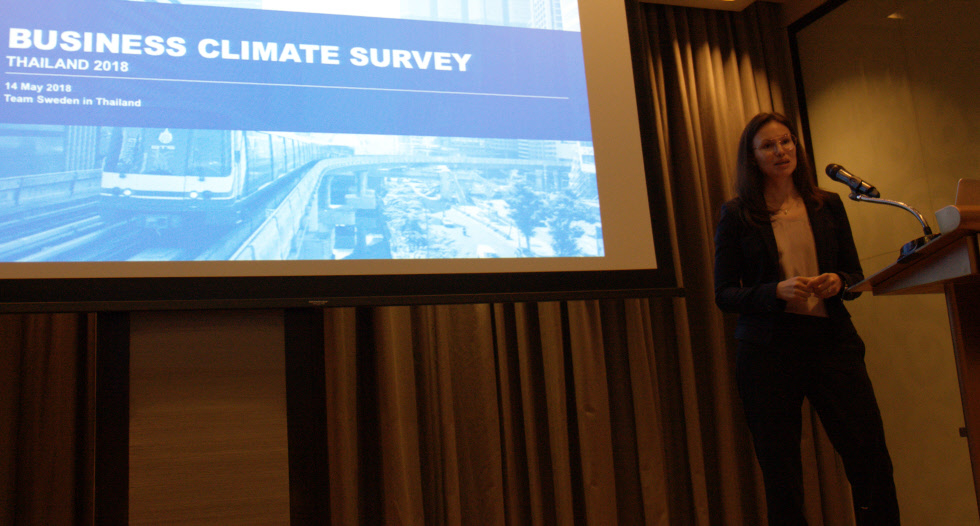
The report highlights some of the views on the business climate of the around 70 companies from Sweden established in Thailand.
To present the result Team Sweden also held a presentation in Bangkok, attended by the Thai-Swedish business community and H.E Sweden’s Ambassador to Thailand Staffan Herrström.
In his introduction to the community Ambassador Herrström began by pointing out that whatever one measures Sweden and Thailand, as well as Swedes and Thais, are close to each other: “Whatever kind of measure you use we are close to each other, Sweden and Thailand, Swedes and Thais: “Be it tourists, relatives, royal families – there are remarkable people-to-people contacts, and commercial contacts on top of that. The number of Swedish companies in Thailand is increasing continuously and covers an increasing number of sectors: telecom, transport, defence, energy, industrial equipment, consumer products, digital solutions, fitness etc.”
“And there is a clear potential for more. Therefore, this survey is of significance not least for our embassy. It presents the kind of contributions that the Swedish private sector is providing to Thailand and it presents some outlooks for the future,” added the ambassador.
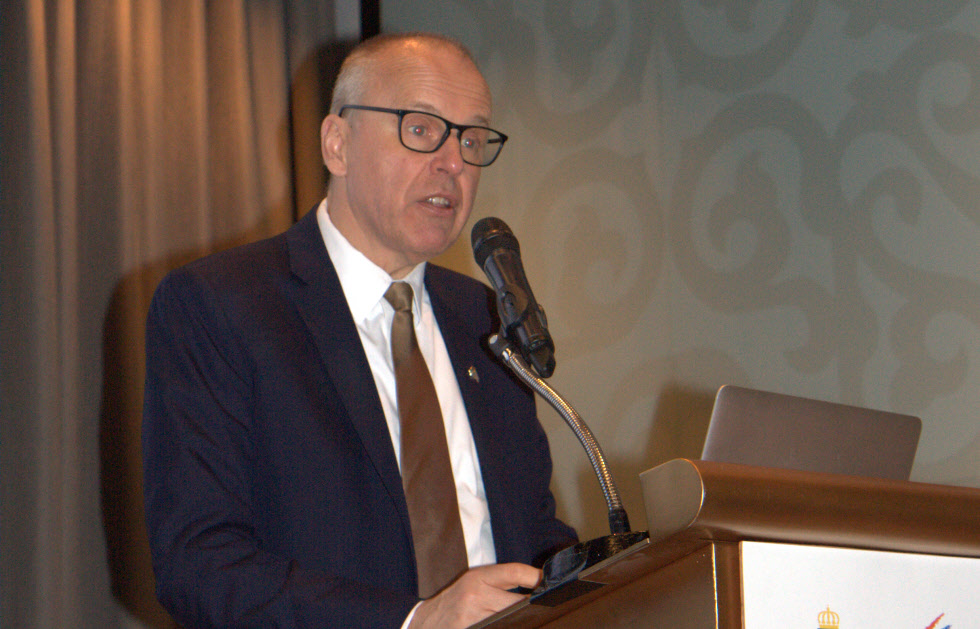
“Swedish innovative products and solutions will help Thailand elevate the country to Thailand Industry 4.0 and build smart cities – be confident we are able to do that. Because our country ranks high on many of the key indexes rankings continuously being presented. We have experiences to share and we have done so in various ways and continue to do.”
Staffan Herrström said that Sweden can offer products and services of high relevance for Thailand’s on-going fourth industrial transition.
“This survey also gives an impression of the challenges that the private sector present in Thailand would like the Thai government to address. The improvement is visible; the ‘Ease of doing business’ World Bank recently showed Thailand moving up from place 46 to 26. That reflects the change. More needs to be done and we know there are remaining challenges that need to be raised with Thai decision makers.”
While the type of businesses in the survey represents a very big spread, a slight majority is within industrial equipment. This rhymes well with the country’s status as a key manufacturing hub in the region and it also mirrors the type of companies in Sweden in general, according to Vivianne Gillman from Business Sweden (Trade Commissioner Vietnam & Thailand) who presented the details from the report.
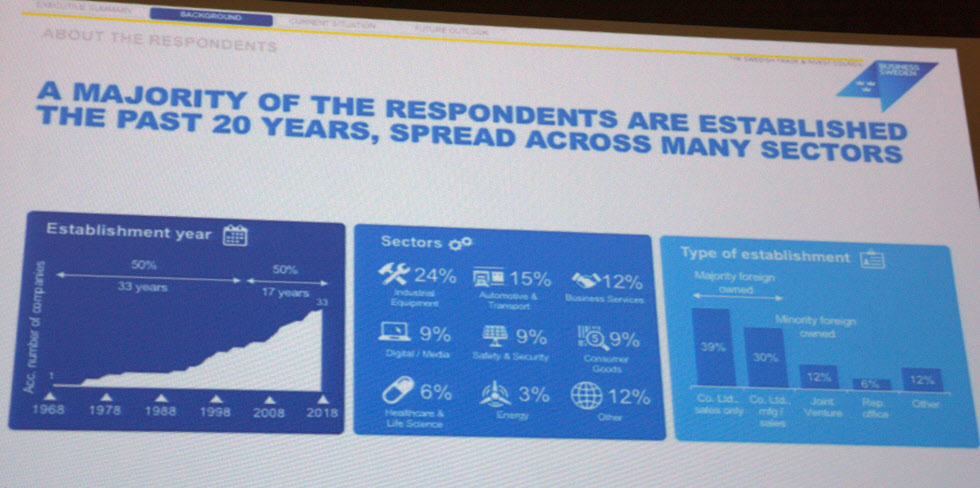
Most of the Swedish companies established in Thailand are majority foreign owned entities; 69 % of the respondents have such a setup.
“This is interesting as we often hear it’s so difficult to have a foreign majority-owned company in Thailand. Still this is the path most of the respondents have chosen to go. However, among those who are minority-owned companies we find most of the smaller companies. You don’t have the financial muscles and as a smaller company it is more difficult to do the foreign majority-owned,” remarked Vivanne.
“11000 jobs are created here by Swedish companies, and one can note that only 36% of the respondents represent 96% of the employees. We have a few big employers here, and quite a long tail of small companies. But this is also what it looks like in Sweden,” she continued.
The survey report includes the key drivers for doing business in Thailand, how they sell and to whom, key success factors and challenges, as well as future outlook.
“80 per cent have ranked the attractive customer base as a key driver. And second biggest one is the strategic location. We think that this shows a good market maturity; it’s not the low cost or other similar aspects attracting Swedish companies here.”
88 % sell to the Thai market, and 24 % sell to other markets as well. Only around 10 % of the respondents manufacture in Thailand and the majority of them manufacture for both the local market and for export markets (12%). Thailand is located centrally in Southeast Asia and offers opportunities for companies to sell to other markets.
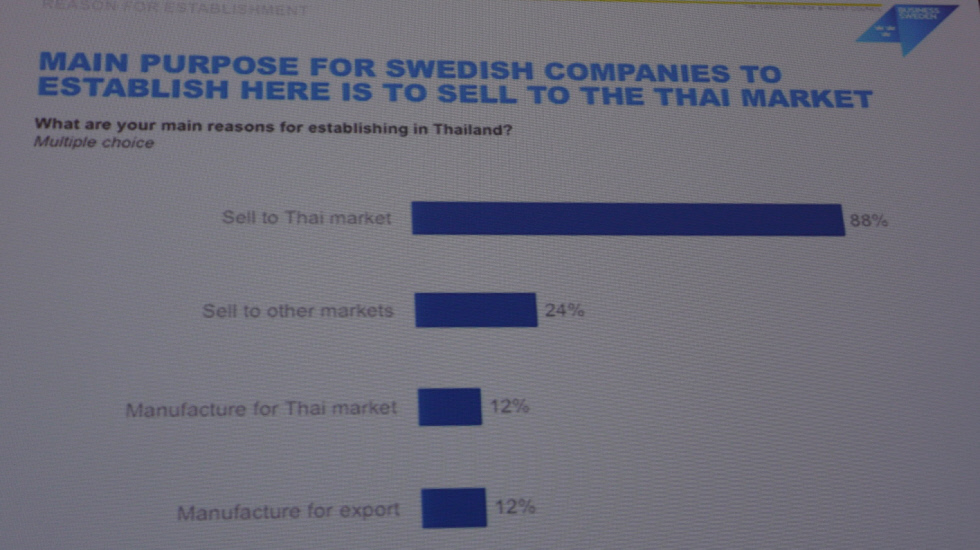
The strategic location – the second top reason why companies are here – serves as a hub for both sales and marketing towards the surrounding areas. One small size company has commented that Thailand is also a good base for future regional expansion.
“Quite few are here to sell to other markets or manufacture for other markets. We still see a clear focus on that they are here because of the attractive customer base and to sell to the Thai market and not as much interacting with other countries in the region. And yet 24 per cent is not that small, so we also see companies using this as a hub,” commented the Swedish Trade Commissioner.
The majority of respondents target the private sector with product sales – 72% of respondents have at least the majority of customers in that area.
“We have around 60 per cent selling to some extent to the government sector as well. This is potentially surprisingly high,” thought Vivianne.
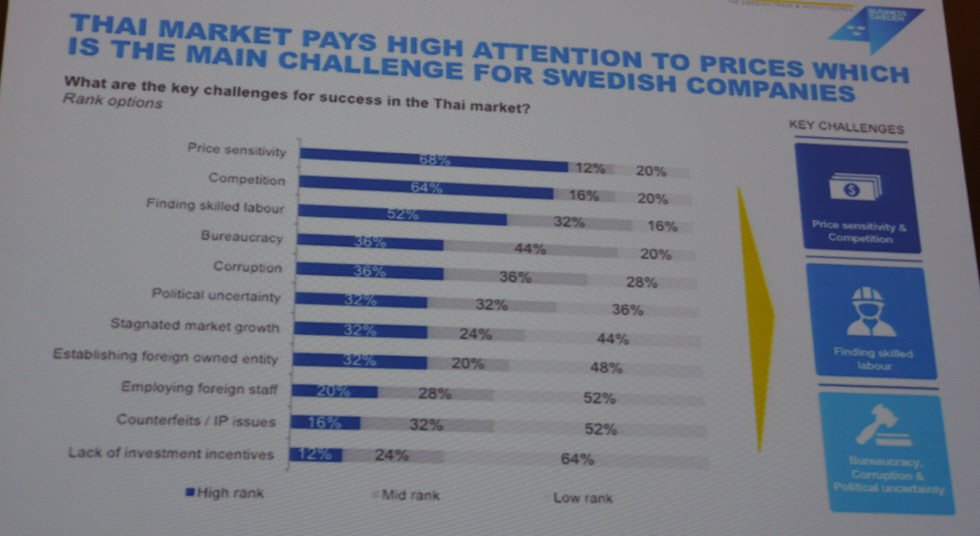
“We see a large group selling mainly products but we also have some services. This rhymes very well with the fact that most Swedish products and services are quite expensive and then to differentiate a lot of companies will have their products but will also have their margin on after sales service, and other types of service and training etc. that will then make it easier to differentiate and be able to have a higher price.”
When it comes to key success factors what stands out are having: in-depth market knowledge, local staff and close relationships with customers, and an innovative and unique offer.
“It’s really about understanding the market and having local presence as well as solutions and offers that are tailored to the market. Having an innovative and unique offer is another type of aspect.”
“In terms of challenges we can cluster these in three different groups. What comes out at the top is price sensitivity in competition; second is finding skilled labour; and the third one is bureaucracy, corruption and political uncertainty.”
Over 30 % lists the third one as a high ranking challenge. But the very fact that price sensitivity and competition comes up at the top definitely shows market maturity, according to Business Sweden.
“What is actually most difficult here is that we are fighting here the likes of Japanese or South Koreans in terms of the products we are selling. Then the Swedish companies have to have a sales strategy to communicate the total-cost-of-ownership concept,” commented Vivianne.
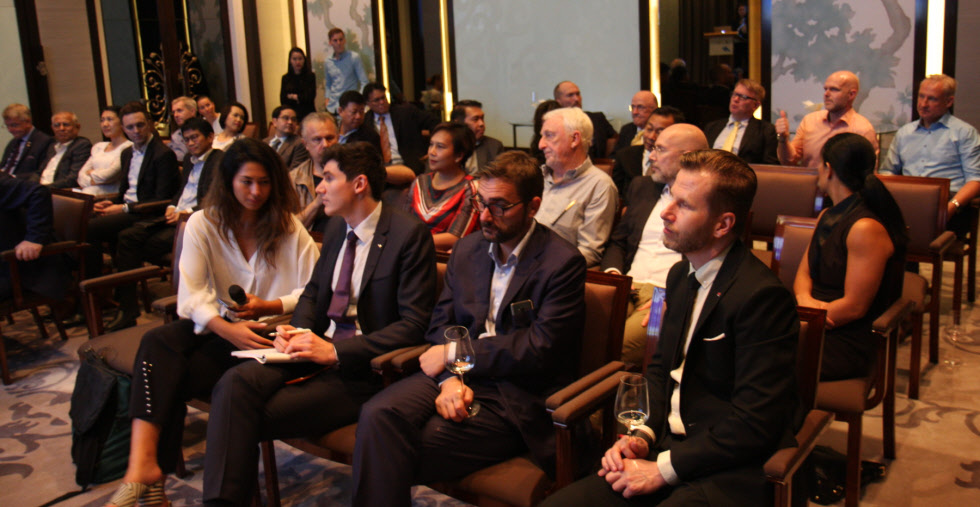
“In terms of finding skilled labour: the larger companies seemed to have even more challenges with this.”
In terms of the future there is an optimistic view for driving growth in Thailand. The Swedish companies have a positive outlook where 84% expect their revenue to grow the coming three years, of which more than 30% expect growth over 20%.
There is also willingness to invest; more companies are intending to do so in the future. “This is also interesting in the perspective of what we want to communicate to Thai government stakeholders; that Swedish companies are investing in skills development/staff training in CSR, R&D and manufacturing – things that are helping to create skills transfer and to increase the amount of jobs.”
